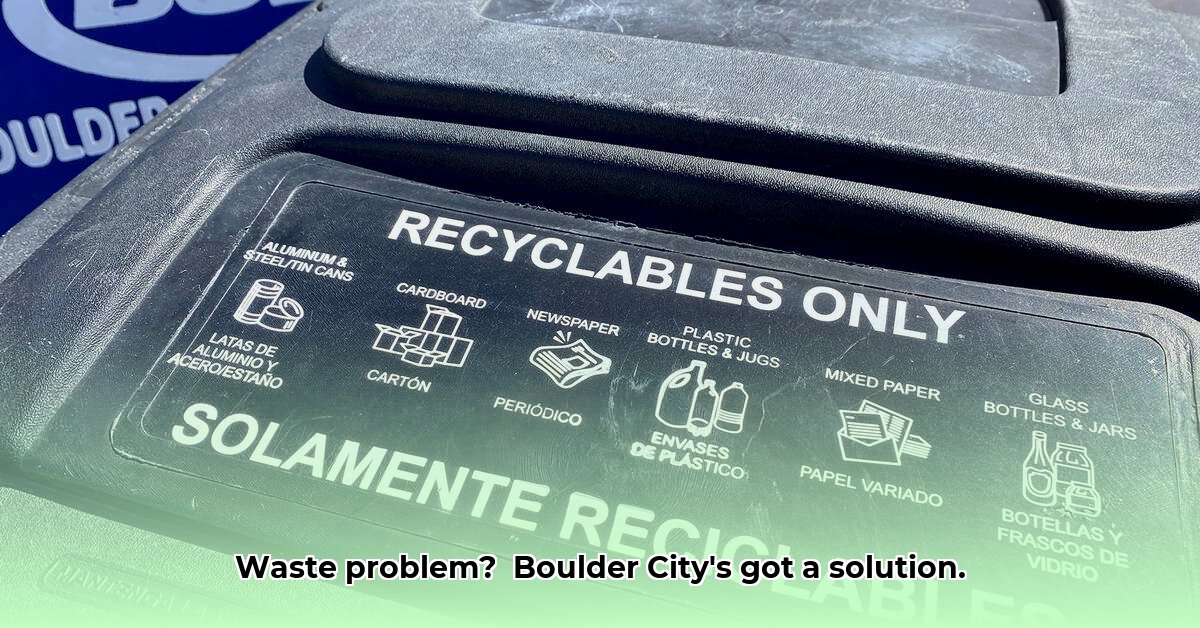
Boulder City's waste management system, while seemingly standard with garbage collection, recycling, and hazardous waste disposal, presents both opportunities and significant challenges. This investigative report analyzes the system's effectiveness, cost-efficiency, and environmental impact, offering concrete recommendations for improvement. Understanding the intricacies of our current system is crucial for building a sustainable future.
Understanding the Costs: Transparency and Accountability
Residential trash collection costs are relatively straightforward, comprising a base fee plus charges for disposal and optional services. However, a significant lack of transparency shrouds the commercial waste pricing structure. This opacity hinders any meaningful assessment of fairness and efficiency. Without detailed financial data publicly available, it is impossible to hold the contracted waste management company accountable and make informed decisions about future waste management strategies. This lack of transparency directly impacts the responsible stewardship of taxpayer funds. How can we, as a community, ensure we are receiving optimal value for our investment if the complete financial picture remains hidden?
The Environmental Footprint: Data-Driven Decision Making
The absence of comprehensive data regarding recycling success rates and landfill lifespan poses a critical concern. Accurate assessment of the environmental impact hinges on this missing information. How much waste is actually diverted from the landfill through recycling efforts? What is the projected remaining lifespan of the current landfill? These fundamental data points are absolutely crucial for effective long-term planning and ensuring a sustainable future for Boulder City. Without them, we are essentially navigating environmental stewardship in the dark. What proactive steps can we take to acquire this essential data?
A Roadmap for Change: Practical Steps Towards Sustainability
Addressing the identified shortcomings requires a multi-pronged strategy focused on transparency, accountability, and innovation. We propose a three-step actionable framework:
1. Re-evaluate the Exclusive Contract: Initiate a comprehensive review of the existing contract with the waste management company. This review should explore alternative models, such as competitive bidding, to ensure optimal service and cost-effectiveness while fostering innovation within the industry. Competitive bidding can inject much-needed dynamism and efficiency into the sector.
2. Demand Complete Transparency: The waste management company must publicly release detailed financial and operational data. This data should include, but not be limited to, precise recycling rates, remaining landfill capacity, and a detailed breakdown of costs associated with each aspect of waste management. This level of transparency is not merely desirable—it is essential for effective oversight and community trust.
3. Foster Active Community Engagement: Encourage active participation in recycling programs and promote environmentally conscious practices. This includes clear and accessible communication regarding waste sorting, and addressing community concerns about effective waste management. Active community engagement is not only a key component of success, but it builds a stronger sense of shared responsibility for the environment.
Assessing the Risks: A Proactive Approach
Potential risks associated with the current waste management system are summarized in the following risk assessment matrix:
| Risk Factor | Likelihood | Impact | Mitigation |
|---|---|---|---|
| Contract Renewal | High | High | Initiate competitive bidding process well in advance. |
| Lack of Transparency | High | Medium | Mandate regular reporting of key performance indicators (KPIs). |
| Landfill Capacity Limits | Medium | High | Explore waste-to-energy solutions and regional landfill partnerships. |
| Recycling Market Fluctuations | Medium | Medium | Diversify recycling approaches and add value to recycled materials. |
| Public Perception of Services | Low | Medium | Implement clear, consistent communication strategies emphasizing sustainability. |
A Sustainable Future: Long-Term Vision and Innovation
Boulder City needs a comprehensive long-term strategy for waste management. This requires embracing advanced recycling technologies and exploring innovative solutions, including waste-to-energy conversion and partnerships with neighboring communities to achieve greater economies of scale. Reducing landfill dependency and fostering a circular economy will decrease environmental impact while improving cost-efficiency. Investing in this vision now guarantees a more sustainable and financially responsible future. What specific technologies and partnerships should we prioritize?
Staying Compliant: Environmental Regulations and Reporting
Strict adherence to all relevant Nevada state and federal environmental regulations is paramount, particularly concerning hazardous waste handling and reporting. Proactive monitoring of regulatory changes is vital for maintaining compliance. Regular audits and transparent reporting will provide assurance that our practices are both effective and responsible.
Working Together: A Collaborative Path Forward
Transforming Boulder City's waste management system requires a collaborative partnership among the City Council, the waste management company, and the community at large. Transparency, open communication, and a shared commitment to sustainability are necessary to achieve our collective goals. The result promises not only improved environmental stewardship but a healthier, more economically vibrant city. What specific steps can we take to foster this necessary collaboration?